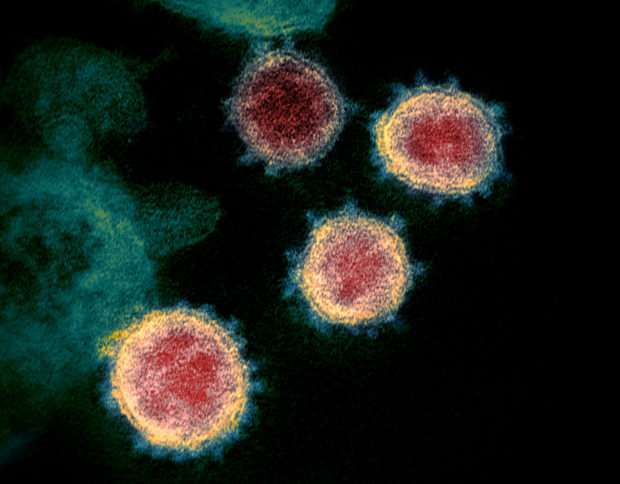MANILA, Philippines — A research group monitoring the trends of Covid-19 in the Philippines believed that the increase of coronavirus cases in Pasay City is linked to the SARS-CoV-2 variants that were first detected in the United Kingdom and South Africa and which appeared to be more contagious.
Dr. Guido David of OCTA Research noted on Wednesday, March 3, 2021, that it has been quite long since the country has experienced an increase of Covid-19 cases as what is being observed now in some areas.
“Ngayon bakit biglang tumaas at tsaka ngayon napakabilis ng pagtaas? In fact ‘yung reproduction number natin sa Metro Manila 1.4 pero kalat kalat ‘yan eh, may ibang lugar sa Metro Manila na mas mabilis. In fact, sa Pasay more than 2 ‘yung reproduction number, tinitingnan natin,” he said in an interview with ABS-CBN’s Teleradyo.
(Now why are we seeing an increase in cases? In fact the reproduction number in Metro Manila is 1.4 but that is distributed among different areas. There are other areas with faster spread of the virus. In fact, Pasay has a reproduction number of 2, so we are looking at that.)
“So ang dahilan dyan kaya pinapalagay namin na ang nagdadrive ‘yan, yung UK variant or South African variant kasi similar naman sila,” he added.
(We surmise that the drivers of the faster spread are the UK and South African variants because they are similar.)
The reproductive number is the average number of persons who may be infected by one Covid-19 positive individual.
The Department of Health (DOH) earlier reported the detection of six cases of the South African variant called B.1.351 variant, three of which are reported as residents of Pasay City.
Read: PH detects South Africa variant; ‘fast containment’ pressed
The United Kingdom variant called B.1.1.7 was also earlier reported from a patient in Pasay City, but the DOH earlier said it saw no link between this patient and the increase of cases in the locality.
The DOH has been reporting over 2,000 daily additional cases in the recent few days. Previously, the number of new cases being added to the tally per day was only over 1,000.
David conceded that there is no sufficient evidence yet to confirm that the variants had caused the spike in cases in Pasay City, except that this is similar to areas with outbreaks of UK or South African variants.
“Totoo na kulang pa ang ebidensya natin kasi konti lang ang nagegenome sequencing pa natin sa lugar na yan (Pasay) pero ang palagay namin, at nakikita natin kapag kinocompare natin sa mga ibang bansa na may UK or South African variant, mabilis ‘yung pagkalat ng cases, kaya namin pinalagay na dahil ‘yan sa variant,” he said.
(While it is true that the evidence we have is not yet enough because only a few specimens are undergoing genome sequencing in the said area, we believe the variants are the reason for the increase, because the faster spread is similar to that in other countries that have reported the UK and South African variant.)
According to Guido, there are two “centers” of the pandemic in Metro Manila, one in Pasay and the other in the northern part of the region covering Navotas and Malabon. He noted that the cases are also increasing in Caloocan and Valenzuela City.
“Pero ang pinakamataas talaga ‘yung attack rate, nasa Pasay, Makati, ibang parts ng Taguig at Manila nadadamay na rin, and then sa north nga ‘yung mataas ang attack rate, Malabon at Navotas,” he added.
(But the highest attack rate is in Pasay, Makati, other parts of Taguig and Manila and the northern part of Metro Manila, specifically Malabon and Navotas.)
Meanwhile, down in Central Visayas, Guido said the cases in Cebu City are “slowing down.” He said new cases in Talisay are also decreasing, and that only the “consistent” increase of cases is in Lapu-Lapu City.
Guido pointed at the lacking implementation of border controls for international travelers as the reason for the entry of new variants of SARS-CoV-2, the virus that causes Covid-19, in the country.
“Alam naman natin na ang border control isa ‘yan sa mga naging problema natin in the past. In fact kaya ang daming nakapasok na variant kasi hindi ganun kastrict ‘yung ating border control sa international travelers or kung strict man, ‘yung implementation medyo nagkulang,” he said.
(We know that border control is one of our problems in the past. In fact, the reason why a lot of variant cases entered the country is because the border control for international travelers is not that strict, or even if it is strict, the implementation is lacking.)
“I mean, bakit marami tayong nakapasok na variant? And problematic itong mga variant na ito kasi mas mabilis ang pagkalat ngayon dahil sa variant,” he added.
(I mean, why did a lot of variant cases enter the country? And these variants are problematic because it is the reason why the spread of the virus is faster.)


